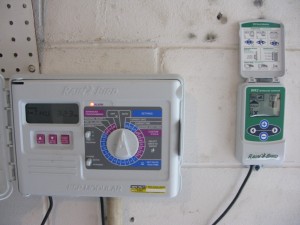
A Rain Bird ESP controller and a Rain Bird WR2 rain sensor
Thank you for visiting the Hessenauer Sprinkler Repair and Irrigation blog and website. We like to inform our online readers about news, tips and advice concerning sprinkler irrigation here in Central Florida and the Orlando area. Today we would like to explore a little more about how irrigation controllers work.
Due to the nature of rainfall all over the world, there are inevitably going to be times that artificially watering the turf and landscape becomes necessary. An ideal irrigation system for turf and landscaping should utilize a minimum number of valves, supply lines and sprinklers. Generally, the valves are turned on and off by a reliable electronic irrigation controller.
These irrigation controllers can be programmed to carry out a wide variety of watering schedules. The goal is to uniformly distribute the optimum amount of water over a given area. The zones, placements and flow rates for each sprinkler is pre-determined upon the design and installation of the irrigation system.
Optimum flow rates which are provided for each sprinkler should fall within about a quarter gallon per minute, or GPM. The amount of water supplied by each sprinkler is largely determined by the size and configuration of its nozzle, although variations result from fluctuations in water pressure that cannot be fully negated with regulators.
Residential and commercial irrigation systems typically include one or more solenoid operated valves that are turned on or off by an electronic irrigation controller. The valves administer water to various underground lines usually made of PVC pipe which typically have several sprinklers connected to risers coupled to the branch lines at spaced intervals. The combination of a solenoid and associated sprinklers is generally referred to as a zone or station. A modern electronic irrigation controller typically includes a microprocessor that executes one or more watering programs.
The controller usually has an LCD display to facilitate the programming by the user. In case of a power failure, the irrigation controller will revert to a default watering program. The microprocessor controls the solenoid devices through electric switching devices, opening and closing the valves appropriately. Each station is then controlled by a corresponding station module which comprises a plastic housing that encloses and supports a station module circuit, as well as wire connection terminals for connecting wires to a plurality of solenoid actuated valves.
Expandable irrigation controllers have gained popularity because they are a hands-free solution to proper watering for the lawn. The advantage of an irrigation controller with a modular expandable configuration is that the controller need only be equipped with the minimum number of station modules that can control the total number of stations needed. Thus, for example, an irrigation system may have only three zones, requiring only a single station module, while another may have twelve stations which might require four station modules.
One type of irrigation controller that does not require a dedicated field valve line to each station is the “decoder” system. These are available in either two wire or three wire versions. In a two-wire decoder system one or two way communication between the microprocessor and the valves is achieved by encoding signals and transmitting them over the same two wires that carry the power to the valve solenoids. The valves are connected in parallel to the two wires through decoder circuits that are used to identify commands uniquely intended for that station.
Hessenauer Sprinkler Repair and Irrigation provides Central Florida with drainage and irrigation system sales, installation, service, maintenance and repair. Our team of professionals want what is best for the customer. Discover the advantages of using a company with over 30 years of experience in commercial and residential irrigation system and drainage here in Central Florida. Bookmark us for more news, tips and advice concerning sprinkler irrigation, and if you have a project that needs attention here in the Central Florida and Orlando area, contact us at 407-302-2227 today!
